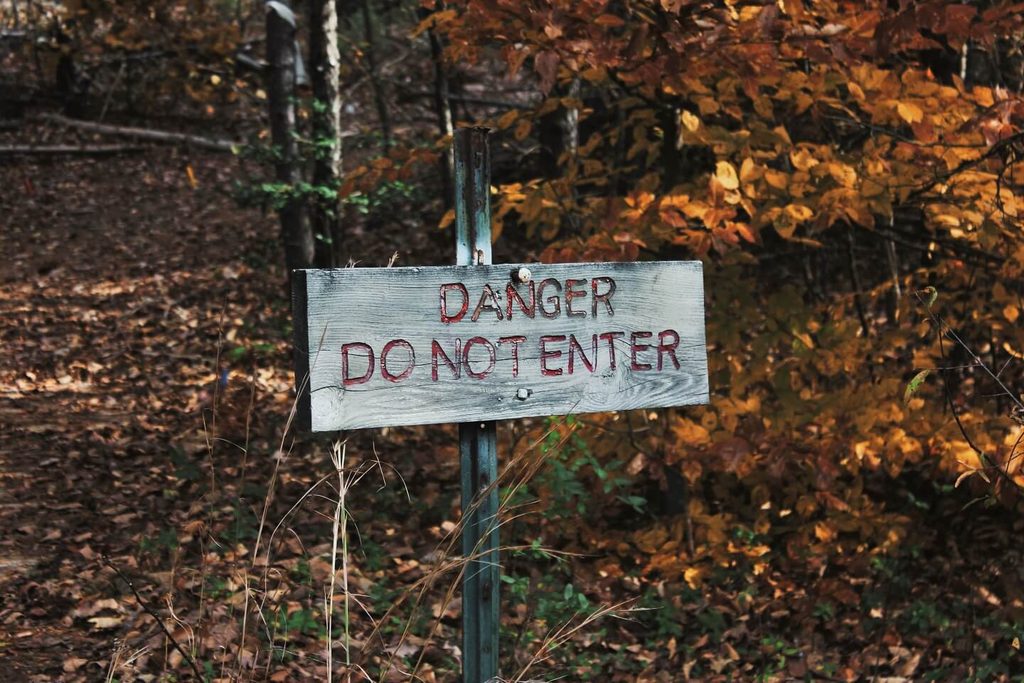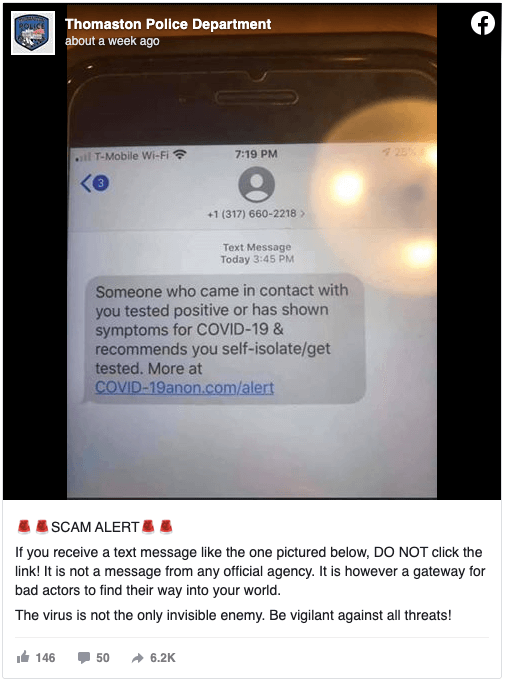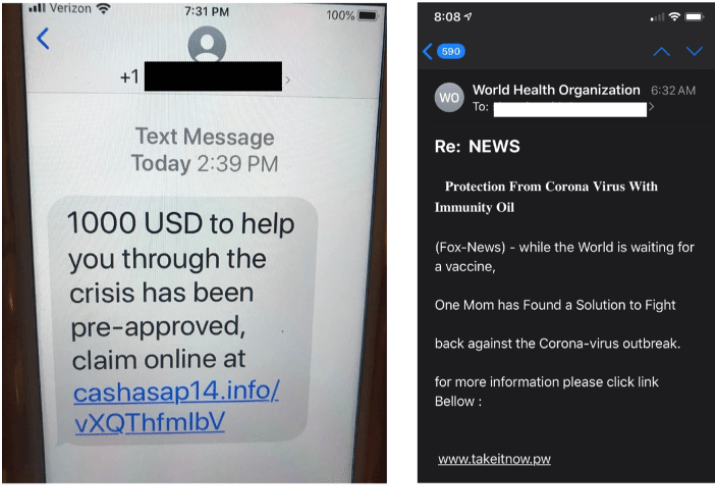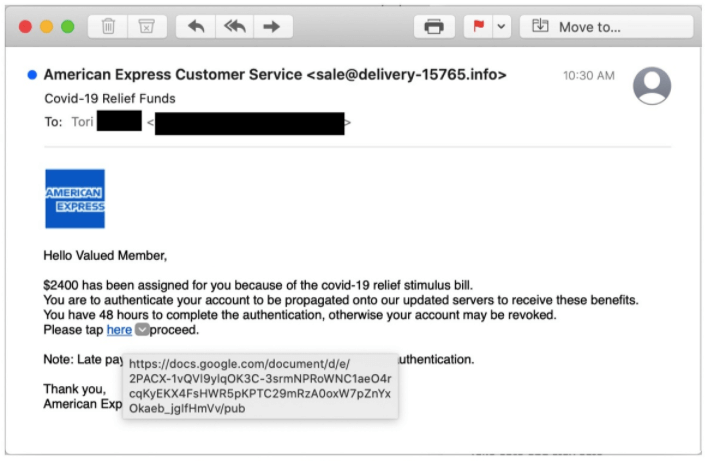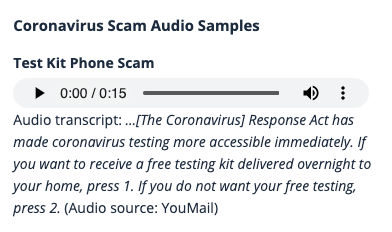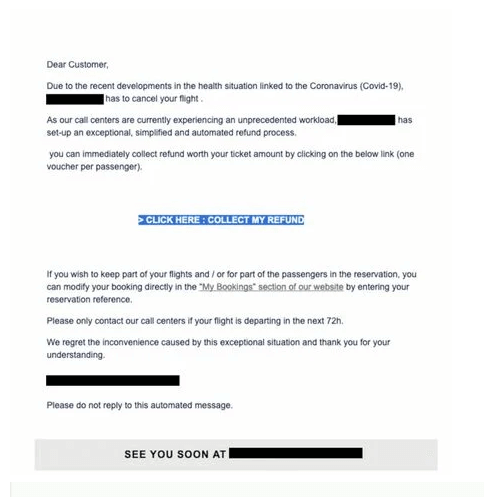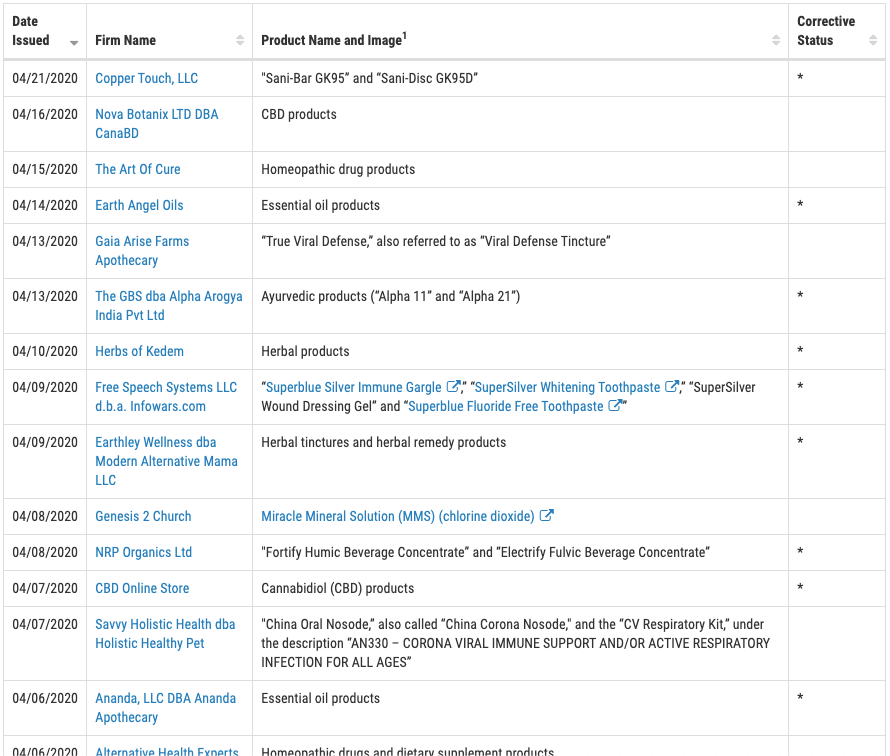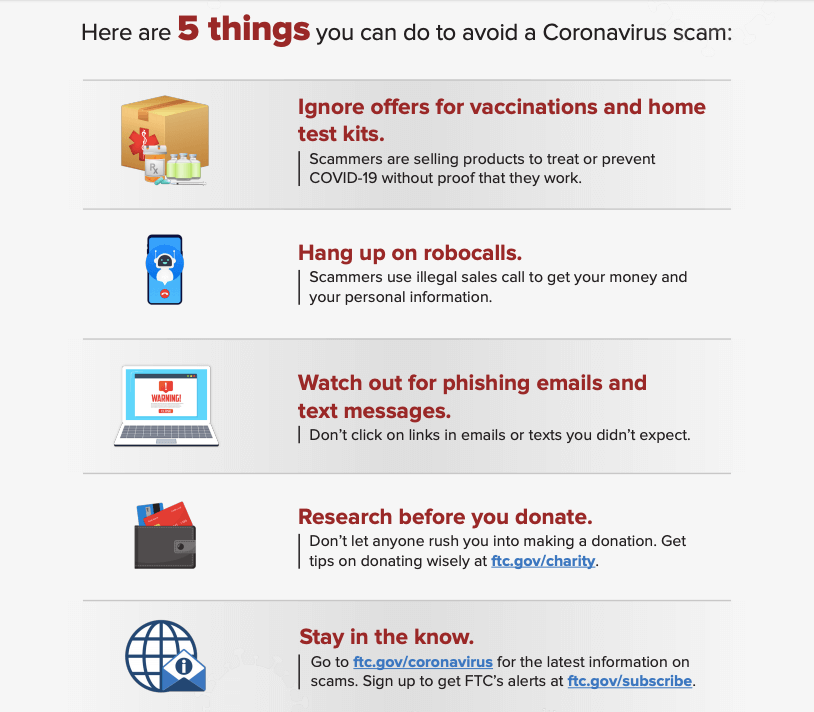Table of Contents for Top Scams during Coronavirus:
- The Infection Notification Scam
- The Stimulus Package Scam
- The Disease Update Scam
- The Flight Cancellation/Refund Scam
- Coronavirus/COVID-19 Product Scams
Crises tend to bring out the best in people. The news is full of stories about doctors, nurses and community members doing what they can to keep the world running smoothly during the Coronavirus (COVID-19) pandemic. There are everyday heroes out there on the front lines making a difference and being rightly recognized for their service.
Unfortunately, though, crises also tend to bring out the worst in people. The COVID-19 pandemic has brought a rash of new scams. They’re often designed to prey on the most vulnerable, as well. Scammers are trying to steal personal information, sell useless products and more.
Phishing (with text, smishing) is the most common type of scam being run during this pandemic. If you’re not aware of what phishing is, it’s the practice of using emails or text messages that look like they’re from someone you trust to gain access to personal data.
Two of the most common means of access are through downloading a virus, through having you enter your personal details on a fraudulent web page. If you stay alert, though, you can stay ahead of the scammers. Forewarned is forearmed, after all.
If you’re a member of HelpCloud Tech Support, then remember to give us a call or contact us 24/7 to ask if something you’re experiencing on your computer, tablet, or smartphone is legitimate or a scam.
1. The Infection Notification
Some Maine residents got an odd text message recently that made them a little uneasy.
“Someone who came in contact with you tested positive or has shown symptoms for COVID-19 & recommends you self-isolate/get tested,” the message read. It included a link to a website that supposedly would tell people how to get tested.
This link is part of a phishing scam designed to harvest personal data. Text messages can be a particularly dangerous form of phishing because people don’t tend to read them closely and they have a very high open and response rate. 98 percent of all text messages get opened, even marketing messages.
If you get a text message from a number you don’t recognize telling you you came in contact with someone who was infected, don’t panic. Don’t click any links. Just move on. Chances are it’s not someone you know. If it was, they’d be in your phone or they’d introduce themselves, and they probably wouldn’t be sending you a link.
2. The Stimulus Package
The US government approved a one-time payment for all eligible residents recently, and people have begun receiving their checks. But this stimulus package has also attracted scammers.
There are quite a few scams going around right now both through text messages and through email that refer to the government’s stimulus package. There are also some that refer to With a new wave of payments to go out and many people still waiting to get the first wave or find out details, it can be tempting to click on the link and find out.
Don’t.
Government agencies don’t reach out to you of their own volition through email, text or phone. If you get an email or text that says it has information about your stimulus payment, don’t trust it. Only trust the IRS itself. Go to their website through your own web browser and check there.
That’s a good rule of thumb for any unsolicited email from an agency that has a website you can check. Don’t follow links. Go directly to the agency to find the information out.
3. The Disease Update
Sometimes you’ll get an email that purports to be from the government and it isn’t about the stimulus package. It’ll be from someone like the CDC, claiming to provide you with updates about the current state of the coronavirus. This spurious update may ask you to download a PDF or follow a link so that you can learn about COVID-19.
Or it could be a phone call, with someone telling you about an opportunity to get testing kits for free. Or an advertisement on the side of a web page.
Sometimes it’s not even a government agency, but someone pretending to be a random private citizen. Or it could be a call from the “DHS.” Whatever it is, someone wants to give you the oh-so-important information that you need to be prepared for the virus.
These are almost always spurious. If it’s an organization or person you know that’s one thing, but phishers are getting more and more sophisticated at spoofing a return address. It doesn’t cost you much except time to give someone a call.
Government agencies are definitely keeping an eye on the virus, that’s definitely true. But they’re not usually in the business of sending out updates. If you really want to find out what’s happening with the COVID-19 pandemic, there are better sources to check.
If you’re worried about your own health, the American Heart Association has a huge list of links that can help you understand what COVID-19 is, how it works, how to avoid it, and how to deal with it if you have it.
The Financial Times also has a tracker that will tell you the progress of the infection worldwide. And probably the best resource available is the Johns Hopkins COVID-19 dashboard. There are plenty of sources out there. You don’t have to resort to fly-by-night emails from random people.
4. The Flight Cancellation
This scam has been a real problem for people who had flights scheduled before the pandemic. Many fliers have had real trouble getting refunds from airlines, which are dealing with a heavy financial hit.
Criminals will put together a convincing-looking form letter that resembles something you’d get from Delta, American Airlines, United, or another major airline. This form letter will inform you that there’s been a change in your flight and it’s been cancelled, and since the call centers are overloaded you have to do it online. All you have to do is click the link to get your refund.
When you click the link, you’ll be taken to a web page where you fill out your personal details and your credit card information to get your flight refunded. But when you do, it sends the information directly to scammers.
Your airline should be available both online and over the phone, no matter how busy the call centers are. And if you’re looking for a flight refund you should be able to talk to them directly. Instead of clicking on a link, check the return address (it can be spoofed sometimes, but it’s the first line of defense).
Then check the website. And you can call the company, too.
5. Coronavirus/COVID-19 Product Scams
The last set of scams that’s become common aren’t necessarily phishing scams, though they can be. They play on the age-old human desire to feel in control of the situation.
The FDA and FTC have already been hard at work shutting down companies that are selling fake products or making claims that they can’t back up. The FDA has a whole list of products that have had cease and desist letters sent to the company.
Both agencies have been working together against these kinds of false products, and if you want to stay up on which products aren’t allowed, you can keep an eye on that FDA page.
Price gouging is a huge issue, too, and sometimes price gouging and snake oil products go together. Even if the product itself is fine, the COVID-19 pandemic has jacked up the prices on many items and profiteers are selling them for far more money than they should. Beware of high pressure sales or claims that this is a product that you “have to have.”
If you see profiteering and price gouging, you can report it to your local attorney general’s office so they can take care of it. Most states have seen a significant spike in complaints, and doing your part will keep people from dealing with the same thing.
There are other issues you can run into, too. Some robocalls and emails are going out that offer free diabetes testing and coronavirus test kits if you sign up with your personal information. This scam has been targeting diabetics specifically and people who are among the most vulnerable to COVID-19.
As always, if you hear something that sounds like it’s too good to be true, it probably is. Trust the people that do this for a living, not random phone calls from telemarketers.
Be Wary …
In any crisis, there are profiteers and scammers that decide to take advantage of people that are feeling a little vulnerable. These profiteers may set up robocalls, send out emails, blast your phone with text messages or even come to you in person.
Staying wary will help you keep your personal information and your money safe.
The most prevalent way for these scammers to get in is through phishing, so you should keep an even closer eye on your email than usual. Don’t trust people who offer you something for nothing. Make sure you know where you’re getting your medicine and medical advice from.
Call or visit the website instead of clicking on any links in a text or email.
As always, if you have any questions regarding the technical details, feel free to reach out to HelpCloud Remote Technicians for remote support.
